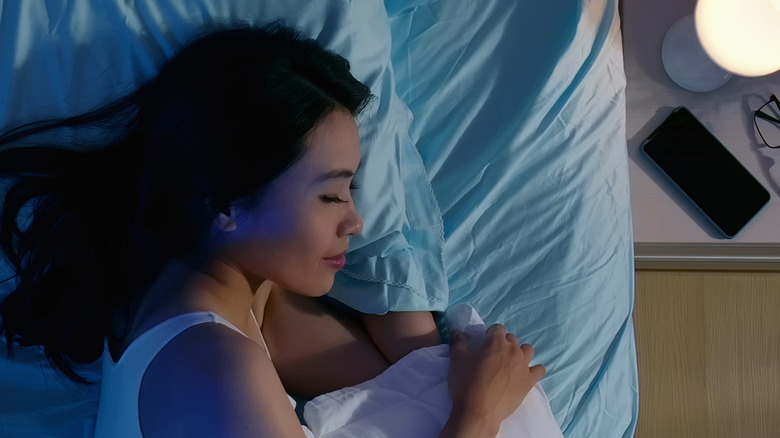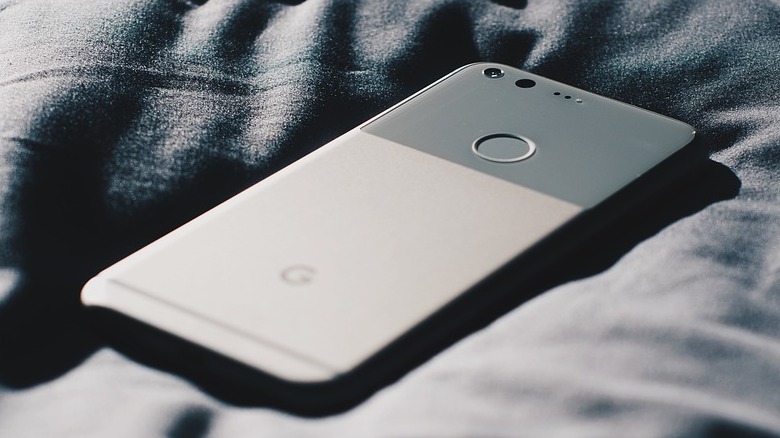Why You Should Never Sleep With Your Phone Near Your Bed
For most people, checking our phones right before going to sleep and immediately after waking up is as much a part of our daily routine as brushing our teeth. Some people have even amped up their bedtime phone access by tucking their phones under their pillows.
While the convenience of having your primary means of communication directly within reach is attractive, the truth is, keeping your phone close by during the night is actually doing more harm than good. A 2020 study published in Nature and Science of Sleep showed that keeping your phone near your bed while sleeping directly relates to poor sleep quality, daytime sleepiness, and increased sleep latency, or the time it takes for you to fall asleep.
Not only can having your phone at hand keep you from sleeping properly due to fighting the urge to check every Tweet and text that comes through, there is also the risk of so-called "doomscrolling," or constantly scrolling through unsettling news and information on your phone (via Sleep.com). Doomscrolling can have negative impacts on your sleep as reading unpleasant news can raise levels of the stress hormone cortisol, making you anxious and unable to settle down (via Ecosa.com). The truth is, whether it's in your hands or just sitting on your night table as you're sleeping, your phone can have adverse effects on your health. Now we'll unpack why.
Your phone is keeping you awake
There is a direct link between bright cell phone screens and the disruption of your circadian rhythm, also known as your sleep-wake cycle. This disruption is caused by the blue light emitted by your phone (via The Sleep Doctor). This blue light delays the production of melatonin, a hormone released by the brain that helps trigger sleep. Even if you're able to fall asleep, the delayed production of melatonin can still impact you, preventing deeper, more restful slumber. Lack of quality sleep can, according to the experts at the Sleep Foundation, result in parasomnias like sleep texting.
Sleep texting is exactly what it sounds like, sending text messages while remaining asleep. While it's more common among teenagers, who tend to communicate more via text even when awake, anyone who sleeps with their phone close by is at risk of sending a sleep text (via The Gelb Center).
In addition to the negative effects sleeping with your phone can have on your health, there is also a physical risk that you may not have considered. The Healthy explains that keeping a phone in the bed is a fire hazard, as the batteries give off heat as they charge. If you're using the phone while it's plugged in, as most people tend to do in bed, then your phone is going to get even hotter. While a full blaze isn't likely without other factors, like defects in the phone or charging cable, once the phone is tucked under your pillow, that heat has nowhere to go, creating potential for a fire.
Rethink your bedroom
In short, your phone has no place in your bedroom. It can only generate negative sleep habits and disruptive sleep patterns. Experts at the Sleep Health Group maintain that the bedroom should be for sleep and sex, nothing else. However, in our modern, device-driven era, our bedrooms are also TV rooms, Kindle-reading rooms, and phone-scrolling rooms. According to the Cleveland Clinic, in order to develop better sleep habits, start by reducing screen time in the bedroom. When you're getting ready to go to bed, plug the phone in to charge in another room and resist the urge to check it during the night. If you use your phone as an alarm clock, try switching it to silent or airplane mode to keep it from sending or receiving messages and data, and charge it across the room, away from you.
Once the cell phone issue has been resolved, start thinking about your bedroom as a place of relaxation and unwinding, not another room in the house where you can work or be stimulated. Keep the lights lower, for example. Brighter bulbs can also impact the production of melatonin, so opt for something lower to create a more relaxing atmosphere (via Michigan Health). The Cleveland Clinic also recommends setting aside the last hour or so of the day just for unwinding and decompressing as part of your sleep routine. That all-important Tweet can wait until morning and your body and brain will thank you.



